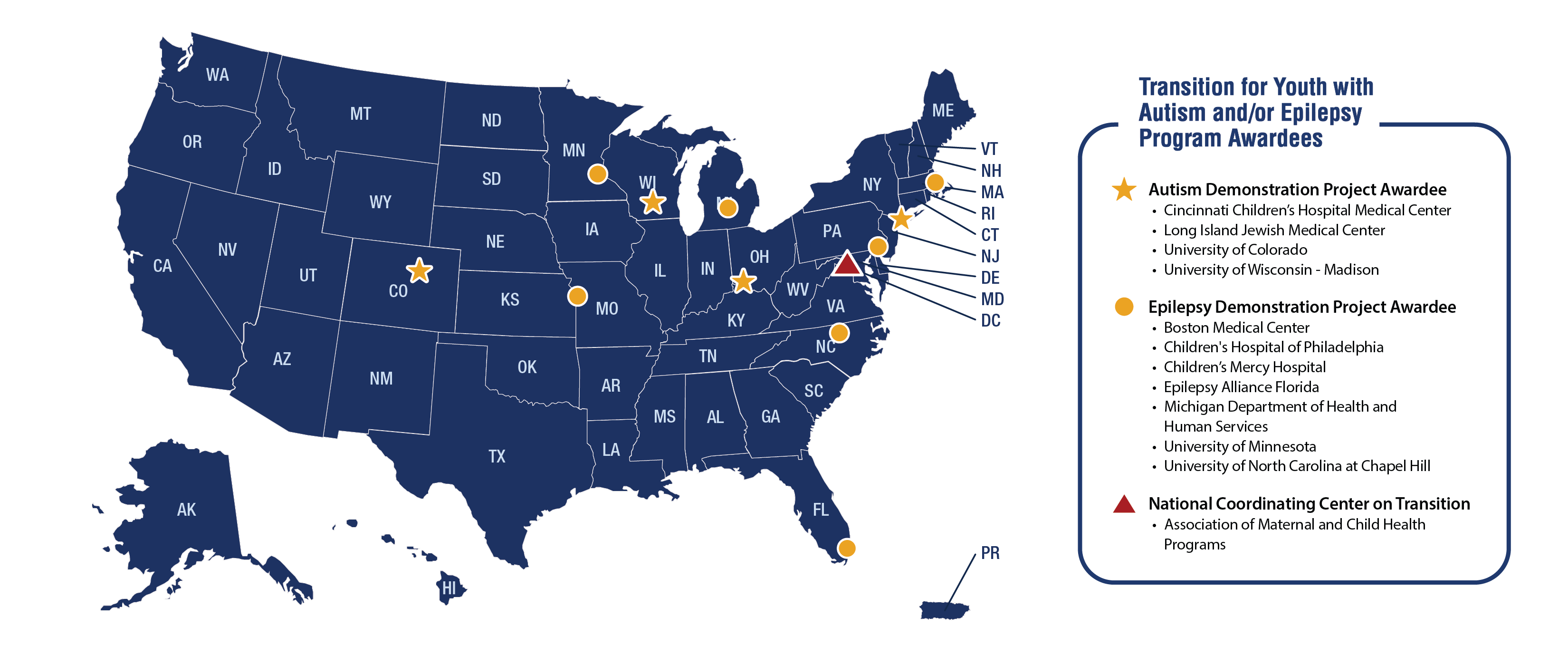The transition from child to adult serving systems can be a challenging process for youth with special health care needs. This process is often more challenging for youth with autism and epilepsy who may have complex health and social needs. They rely on their families and caregivers for help. These projects aim to connect the different services that help youth, like health care, education, jobs, and independent living.
Awards
- The fiscal year 2024 (FY24) Awards Chart shows the coordinating center award winner and the 11 demonstration project winners.
- For more details on this project, read the closed funding opportunity notice (HRSA-24-042) for this project on grants.gov.
Our reach
This program has a national reach. Demonstration project grantees are located in 11 states. The Association of Maternal and Child Health Programs (AMCHP) provides a national coordinating center that:
- Supports these projects
- Promotes best practices
- Provides national leadership to partners involved in the transition field across the country
This center is called the National Coordinating Center on Transition.

Map description
Map of the United States including Puerto Rico showing the locations of Transition for Youth with Autism and/or Epilepsy Program Awardees. Three types of location are shown.
Autism Demonstration Project Awardees: Cincinnati Children’s Hospital Medical Center (Ohio); Long Island Jewish Medical Center (New York); University of Colorado; University of Wisconsin – Madison.
Epilepsy Demonstration Project Awardees: Boston Medical Center (Massachusetts); Children’s Hospital of Philadelphia (Pennsylvania); Children’s Mercy Hospital (Missouri); Epilepsy Alliance Florida; Michigan Department of Health & Human Services; University of Minnesota; University of North Carolina at Chapel Hill.
National Coordinating Center on Transition: Association of Maternal and Child Health Programs (Washington, DC).
How this program works
The goal of this program is to improve the health and social systems that help these youth as they become adults. It helps young people with complicated health or social needs who need more support than other young people.
Through this program, awardees:
- Establish or strengthen leadership teams that coordinate health and education systems improvement
- Include family and youth leaders when designing and improving systems
The 11 demonstration projects will carry out and test strategies to provide integrated services for these young people. They will develop programs and products such as:
- A family navigation toolkit that could be used in other states
- Social support coaching programs focused on families
- A mobile health platform to help youth and their families make future plans
To make these systems better across the country, in states, and in communities, the AMCHP national coordinating center will:
- Define what a “successful transition” looks like
- Find activities that help with successful transitions
- Help demonstration projects carry out their plans
Who this program serves
This program helps young people ages 13 to 26 with autism and epilepsy who:
- Have other health conditions
- Have intellectual disabilities
- Struggle with social skills, personal interactions, and communication
- Need more support and coordination from their families
This program also helps their families. Youth with autism and epilepsy are a sub-population of children and youth with special health care needs.
How this program furthers the Blueprint for Change goals
The Blueprint for Change is a plan to make big improvements to the systems that help children and youth with special health care needs (CYSHCN).
Families of CYSHCN say that the current system of services isn’t working. Even though there are programs to help with becoming an adult, there’s a lack of information and coordination between child and adult systems. This causes problems in planning, navigating, accessing, and integrating quality services.
For example, a study about transition care found that only 14% of young adults with autism and 31% of young adults with epilepsy talked with their pediatrician about switching to an adult provider before they turn 18.
This program will help families better understand and use these services and will help providers improve the care and coordination of these health and social services.
More information
News & events
Stay up to date with MCHB: sign up for newsletters.
Jobs
Find open positions with HRSA.
Contact us
Need more information, or have a specific question about this program? Email transition@hrsa.gov.